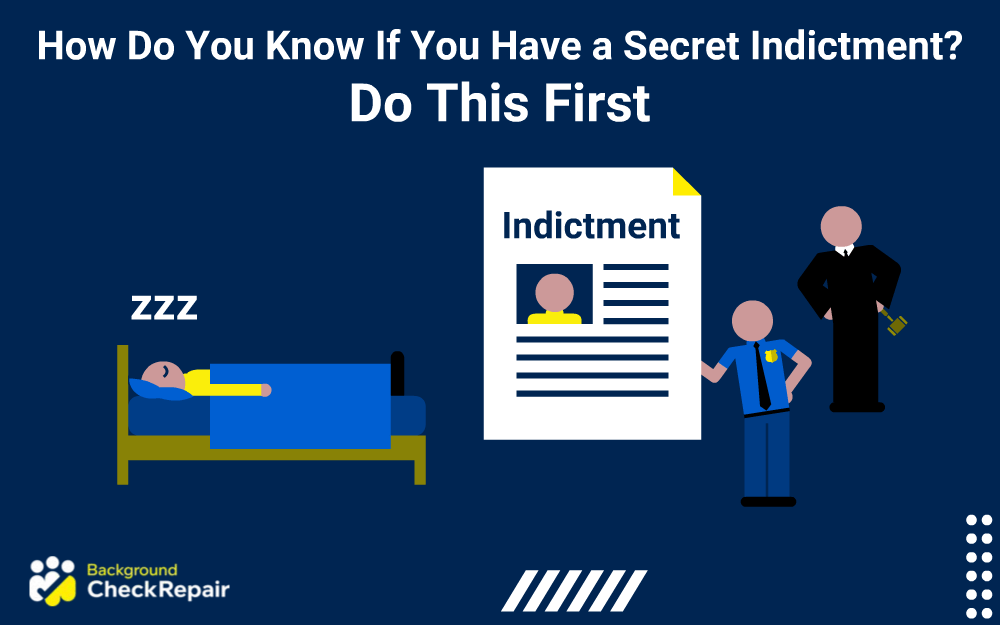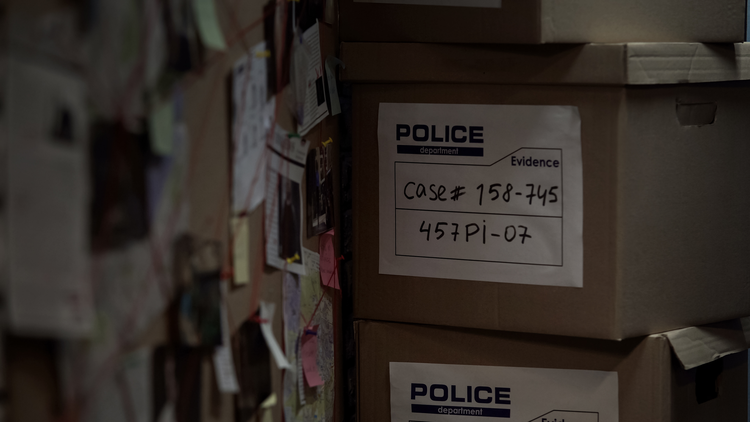
How do you know if you have a secret indictment filed against you? The answer to this question is a difficult one, but there is something that can be done right away to help figure it out.
First, you must realize that there are a number of reasons that an indictment may be sealed or secret. This makes it purposefully difficult for an individual to find out if they have one or not.
With that said, there are very concrete steps that can be taken by anyone to at least learn some important information about a potential secret indictment.
Simply put, if you believe you may have a secret indictment against you, above all else, educate yourself and follow the steps below first. As they say, knowledge is power–and you need all the information you can get when it comes to something this serious.
How To Tell If You Have a Secret Indictment
Although uncommon, secret or sealed indictments do happen in the United States and it can be helpful to know how to find out if there are pending charges against someone that may lead to an inevitable recent arrest. The reason for an indictment being sealed varies from case to case, but it is usually done if there is a fear that the person being indicted may flee when they find out that they are supposed to stand trial. It is also used to protect witnesses or other people related to the case.

It’s important to remember that an indictment of any kind, secret or not, does not mean the person named in the indictment is guilty of a crime, only that there is sufficient evidence to believe that they were involved in a crime.
In high profile cases, such as those involving potential homicides, a secret indictment may be made to prevent the person accused of fleeing to another jurisdiction or even a foreign county.
The good news is that, in general, there must be substantial evidence that fleeing or witness retaliation are possible in the case in order for a Grand Jury to issue a secret indictment. This evidence often comes from past arrests or convictions in which the accused tried to flee in the past or demonstrated behaviors that pose a risk to the public if a normal indictment is made.
So, how do you know if you have a secret indictment? The short answer is that it’s not really possible to know for sure, but there are a few things you can do immediately.
Sealed indictments are taken very seriously and are only known and allowed to be discussed by the Grand Jury that issued the indictment. However, there are a number of resources which can be utilized to learn some information around criminal proceedings to learn if a sealed indictment is a possibility for a certain case.
Step 1. Search Local Arrest Records and Police Reports
The first step for individuals who believe a secret indictment has been filed against them is to search local arrest records and police reports for any useful information.
Most jurisdictions will offer some sort of name-based background search to make this relatively simple and it can supply the individual with valuable information, such as police reports and any arrests that may have been made relating to those reports.
Regarding what specific information to look out for when combing through police reports, it will vary based on the situation or potential situation.

Typically, individuals trying to find out if a secret indictment has been issued, likely have a good idea of the event that prompted the police to believe a crime took place.
For example if the potential secret indictment was related to a domestic dispute, then searching for police records about the domestic dispute may reveal information that police have gathered, which will point to a felony taking place in the eyes of the law.
How to Search Local Arrest Records and Police Reports
Searching local records and police reports will vary based on the jurisdiction. The first place to check is through the local police department website.
A simple google search such as, “[City] Police Department records” should turn up useful information as to how and where the necessary records are kept and how they can be accessed. From there it’s usually as simple as supplying as much information as possible to narrow down the search.
Police Record Search Example
To access police reports that may be connected to a sealed indictment, the following steps can be used for most all local and state law enforcement agencies.
Step 1: Access the Police Department Website
Using the official police department website is usually the where information on police reports can be found, as is the case for the Nashville Police Department. Looking for the following phrases on the website should narrow down the search:
- Freedom of information Act request
- Records Department
- Request Records
- Administrative Services
Step 2: Access the Police Records Section
For the Nashville police department, the information can be found under the Administrative Services menu, then found under the Central Records Division link within the menu.
Step 3: Complete the Request
Each police department will have different rules and policies due to varying local laws about police records, but for most the process is as simple as calling or emailing using the information provided, and giving the necessary information.
For the Nashville Police Department, the following options are available to request information.
- Download and complete an Open Records Request Form
- Request Records in person at the police department.
- Request records by email via [email protected] Or [email protected]
- Request records by mail.
Step 2. Check Local and State Court Records
Another option for answering the question of “how do you know if you have a secret indictment?” is to check local and state court records. Although much of the information in local and state court records will overlap with some of the police records that may have already been searched, they can still offer useful information by searching the names of individuals involved with the event.

The process is similar to searching police records but simply involves going through the local court system to make the request.
State and Local Court Search Example
Step 1: Access the Local Court Website
Just like with police records, a simple google search for the local criminal court will get individuals pointed in the right direction for what records are kept and open to the public.
In Davidson county this is done through the Criminal Court Clerk of Davidson County website.
Step 2: Locate the Records
Records are often kept online in a searchable database, often under the terms below:
- Court Records
- Records Division
- Case Search
- Case information
In the case of Davidson county, it can be accessed through the search case information link.
Step 3: Complete the Search
From here it is as simple as following the on-screen prompts for each individual record keeping system. In the case of Davidson County, the public case search only requires a name, or case number to immediately complete the search.
Search Sheriff’s Department Records
Local sheriff’s departments also have records that can be accessed by the public, however the court system tends to have much if not all the same information and will generally be easier to request a search.
If individuals still wish to search sheriff’s office records, particularly for arrests, the steps are the same as for local police records and court clerks.
Step 1: Access the Sheriff’s Department Website and Locate Records Information
For the Davidson County Sheriff, the records section can be found by accessing the “Inmate Records Requests,” link under the “services,” tab on the website’s homepage.
Step 2: Follow Specific Instructions to Make a Records Request
Davidson County Sheriff’s Department does not have an online records system. Instead a request must be made which will be completed by the police department. Requests can be made in two ways:
- Filling out an Online Record Request form (Provided on the page)
- Call the offender information phone number and make a request (615-862-8123)
Many people forget that the internet offers many useful features for how to find out if you have a sealed indictment. Although it’s not possible to find the sealed enditment itself, users can search for news articles and public information about a particular incident.
For example, if an incident that may lead to a sealed indictment occurred on a certain date and in a certain town or jurisdiction, users can perform a google search of those terms, to see what comes up in the search results.
Perhaps there will be a news story about the incident, which will include names and charges that have already been filed in the case. Users can then take that information and use it to search the state and local law enforcement and courts to glean more info about a secret indictment.
Step 4. Consult a Criminal Lawyer
After performing all the other possible checks listed above there may still be the simple question of “how do you know if you have a secret indictment?” Even after searching police and court records, only so much information can be discerned and the question of a secret indictment may remain. Unfortunately there is very little the individual can do at this point to find more information.

In this case, when all other options have been exhausted the only reasonable plan of action is to contact a criminal lawyer. Criminal Lawyers will have access to more sensitive information that is not available to the general public, or at the very least can learn more information than the individual. Not only will they have a better chance of answering the question of whether or not a secret indictment has been issued, they can also advise the individual on how to proceed while they try to figure out the answer and also explain the timeframe police have to charge you with a crime.
Criminal defense attorneys should be easy to find. Simply get in contact with one that comes highly recommended and deliver any information as to why a secret indictment may have been issued as well as basic personal information so that they can begin their search.
What is a Secret Indictment (aka Sealed Indictment)?
A secret or sealed indictment is an indictment that the grand jury has decided not to make public knowledge. This is usually done if the grand jury has reason to believe that making this information public poses some kind of risk. The risk can be of the individual fleeing to avoid arrest or to retaliate against someone involved in the event that led to the indictment.
What is a Grand Jury Indictment?
A grand jury indictment is when a grand jury decides that someone should be charged with a crime. The grand jury is presented with evidence by the prosecutor and the jury decides if the evidence is sufficient to believe that a crime may have taken place.
If they believe the evidence is sufficient and that a crime may have taken place they will decide to charge a suspect with a crime. Once charged that person is now “indicted,” by a grand jury.
Is the Federal Grand Jury a Secret?
The federal grand jury has always been a secret. The secret of a grand jury is essential to the purpose of a grand jury as it allows the jurors to be free of outside influence which could otherwise impact their decisions. Just as with jurors in a criminal trial, creating a system that is free from bias is extremely important to the United States justice system.
How Do You Find Out if You Have A Sealed Indictment?
There is no easy way to find out if someone has a sealed indictment. There are a number of ways to check information around the event to get a better idea if a sealed indictment was issued, but this will only give evidence to a sealed indictment and not a firm answer.
The best thing to do if an individual believes they may have a sealed indictment is to contact a criminal defense lawyer and explain the situation. Because usually the first indication of it is an arrest.
So, how do you know if you have a secret indictment? Unfortunately there is no easy answer and in most cases individuals have almost no way of knowing. There are a number of steps that can be taken to gather valuable information, but the best thing to do is contact a criminal defense lawyer as soon as possible.






